Clients are the most important part of any business.
It’s simple—you can have the best service or product in the world, but your business can’t exist without clients that use them.
That’s why client management skills are crucial. Every client is different, but the skills we’ll talk about in this article are universal. Master them, and you’ll be able to handle any client, however easy or difficult they may be.
Let’s dive in!
- Problem-Solving With Confidence
- Patience (It’s a Virtue!)
- Persuasion Is Powerful
- Friendly Communication Is Essential
- Empathy Is the Goal
- Conclusion
Problem-Solving With Confidence
Having solid problem-solving skills and using them confidently in the right place at the right time is one of the skills that can significantly improve your relationships with your clients.
If clients view you as a problem solver, they know that they can put their trust in you and count on your service. Even if they have some doubts about going into business with you, demonstrating a problem-solving attitude can ease their worries.
Let’s take a look at one example of a confident solution-seeking attitude. Below is an example of an online exchange between a client and a service provider.
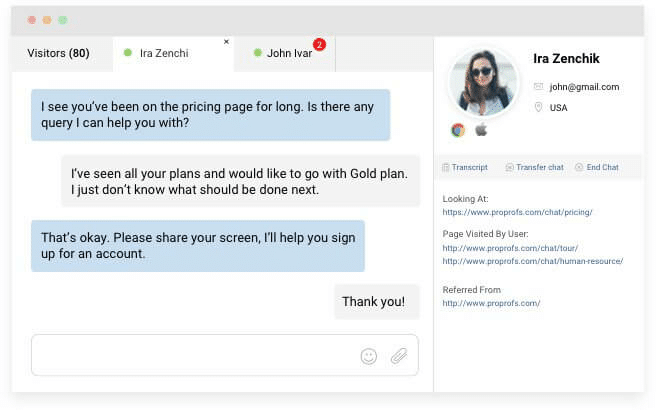
Source: proprofsdesk
As you can see, the provider was tracking the client’s behavior on the website, and they noticed that there might be a problem.
They took the initiative and demonstrated a can-do attitude even before the client asked for help. The provider showed that they could solve the problem and offered a solution, and the client appreciated it.
The example above also demonstrates the skill of handling problems quickly, which can be an important factor in clients’ decisions about doing business with you.
Research from Inmoment, cited on ProProfs, shows that the longer you take to respond to customers’ problems, the less likely they are to do business with you in the future.
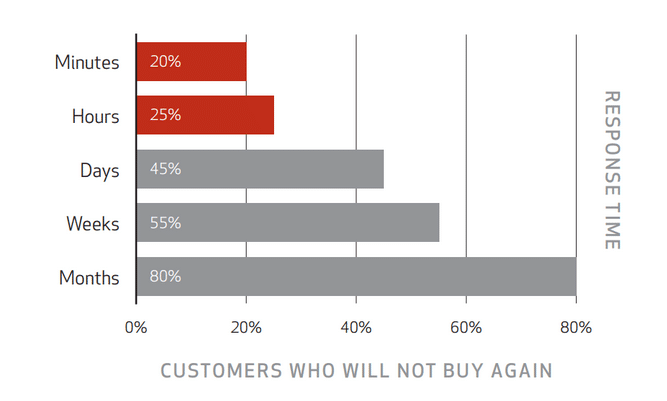
Source: proprofsdesk
Therefore, polishing your skill of confident problem solving can positively affect your business in the long run.
And to be able to solve problems, you need to know the ins and outs of your service or product. Learning and updating your knowledge should never stop.
Your confidence in your problem-solving skills will improve if you know that the client can’t catch you off guard with an issue or a question.
A helpful way to build up your knowledge is by creating an internal knowledge base—a source of information for you and your team that helps you store all the important company data.
Software solutions like Slite are useful for building a comprehensive knowledge base that you can organize, edit and improve to stay up to date with relevant information.

Source: Slite
Building and maintaining a knowledge base isn’t a small feat, but it can be a great way to increase your confidence. After all, knowing every detail about your service or a product allows you to solve your clients’ problems with ease.
You can approach improving your client management skills from many different angles, but the ability to solve their problems, sooner or later, always comes up. Confidently and quickly identifying and addressing clients’ problems shows them that they’re in good hands.
Patience (It’s a Virtue!)
Some clients are more demanding than others, or they even have unreasonable demands.
That’s the nature of human interactions—and that’s why patience is a skill that you should polish until it shines.
One person that did just that is Steven Weinstein, the Zappos employee who answered a call from a customer and stayed on the line for 10 hours and 43 minutes.
Source: Zappos on YouTube
The client needed help ordering a few items from this online shoe and clothing retailer.
They continued talking even after Weinstein helped the customer.
As he said, he didn’t want to break some record—he just wanted to impress a customer.
And the customer was indeed impressed. She told him that she’d never been treated like that by any company ever.
That kind of stoic-like patience with clients isn’t unheard of in Zappos; after all, their previous record for the longest customer call was 9 hours and 37 minutes, and Weinstein himself was eventually dethroned by a phone call that was 10 hours and 51 minutes long.
The company intentionally goes to great lengths for their customers—that’s their way of adding value to the company, forming relationships with the customers, and building their image.
Being so patient that you can stay on the phone for 10 hours is part of their philosophy.

Source: FreshWorks
Whether your business is online retail, software development, or team-building activities, patience with clients is a virtue.
If you haven’t already, you’ll undoubtedly encounter demanding clients; one of the ways you can demonstrate patience is by providing them with as much information and answers as they need.
For example, you can treat them like they’re a team member and involve them in every step of your business procedure. Some development companies achieve that by granting access to their process to everyone—including their clients.
One Reddit user suggests a Trello board for that.

Source: Reddit
That’s what the live streaming service Twitch did.
They launched a public Trello board to give their users insight into what their engineers are working on.
They also have recommendations, updates, and useful links on the board. Users can also send them questions and ask for technical support.
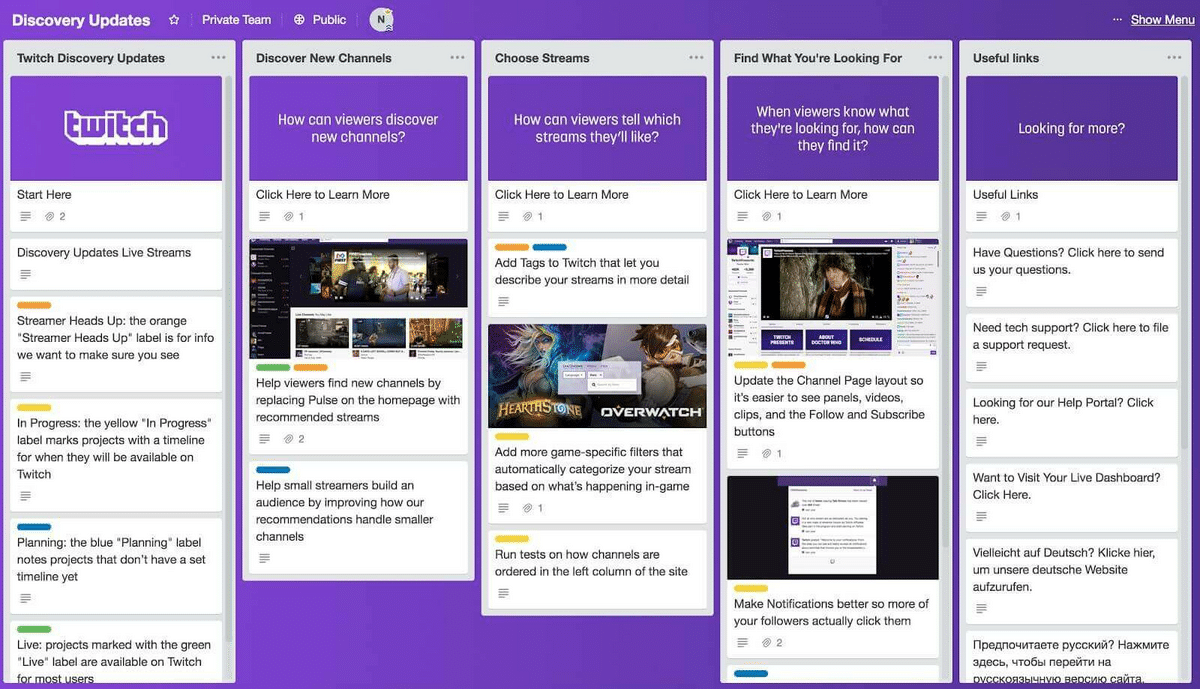
Source: blog.trello
Being transparent and patient like they are at Twitch can be an excellent way to gain trust and respect from clients, even the most difficult ones.
Going out of your way to meet your clients’ demands will positively impact the reputation of your business, no matter what service or product you offer.
Persuasion Is Powerful
Persuasion is undoubtedly one of the most powerful client management skills. If you can successfully assure a client that what you’re offering is exactly what they need, your business growth is inevitable.
A good way to persuade your clients to do business with you is to demonstrate the benefits they can get, as marketing expert Jeff Grover advises.
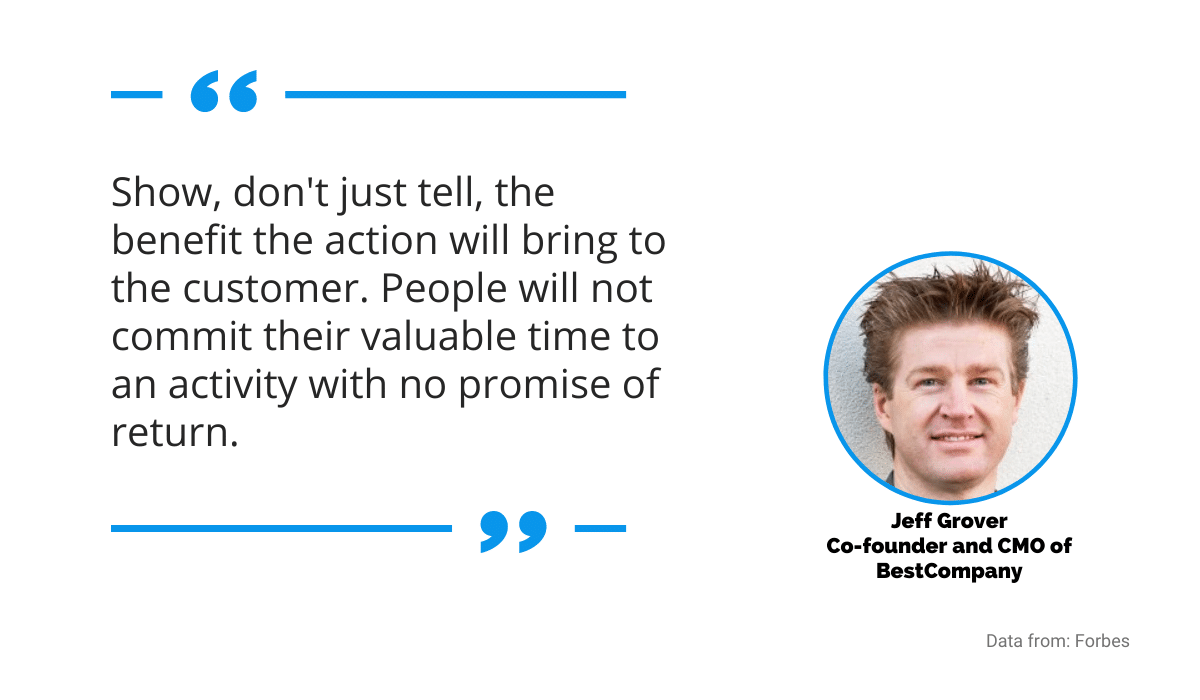
Source: Regpack
He also adds that it’s beneficial to make it easy for your clients to feel and visualize the reward they can get by using your services, efficiently persuading them to do business with you.
For example, Fitbit, a company that makes wearable technology for health and fitness, has a blog section on their website where they share their customers’ success stories—from losing weight and competing in races to adopting a meditation habit and healthy routines.

Source: blog.fitbit
Social proof of the quality of your business is another effective method of persuasion. That simply means that you show your clients what others think of you and your company.
That’s another principle that Fitbit uses for persuasion purposes. On their website, they have a subpage dedicated to curating favorable reviews and praises for their products from various reputable sources like fitness and lifestyle websites.
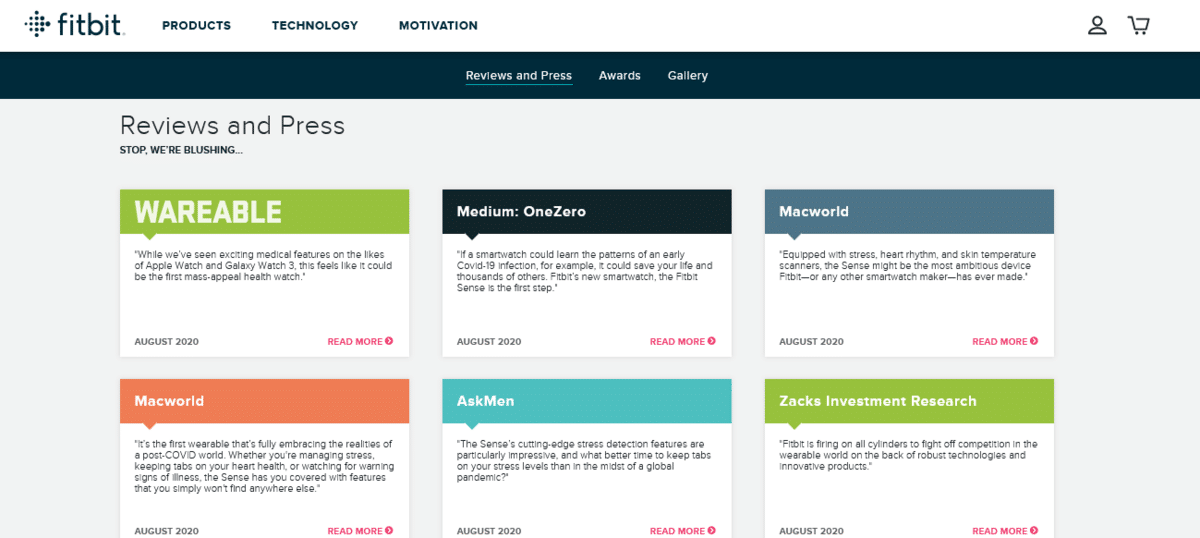
Source: Fitbit
When a client sees recommendations from authoritative sources in their fields like Men’s Health, Cosmopolitan, or CNET, it’s likely that you can efficiently persuade them to do business with you.
The power of persuasion is virtually limitless; the better you are at showing your clients why they should be in business with you, the more of them you can attract and keep.
Friendly Communication Is Essential
Communication skills are the foundation of a good relationship with clients.
Whether you encounter a misunderstanding, a problem that needs to be solved, or you need to persuade them not to go to your competitor, friendly communication is a powerful tool in your arsenal.
Even if you have clients who test the boundaries of your goodwill, it’s essential that you remain professional and friendly in your communication.
According to a survey done by GatherUp, almost a quarter of surveyed consumers said that rudeness and bad attitude from customer service would cause them to file a complaint.
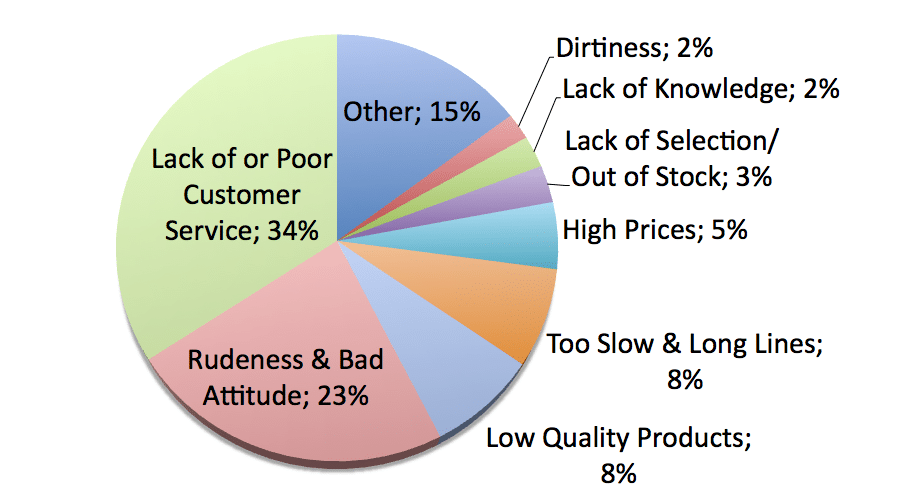
Source: GatherUp
The only reason that topped rudeness is poor customer service or a total lack of it. Therefore, the takeaway is that the only thing that bothers customers more than rude communication by a business is no communication at all.
And if the customer complains, you should remain friendly and open to mending your relationship with them.
One of the worst things you can do is to ignore their complaints. In spite of this, according to research by Harris Interactive, cited on Nextiva, 79% of customers end up ignored.
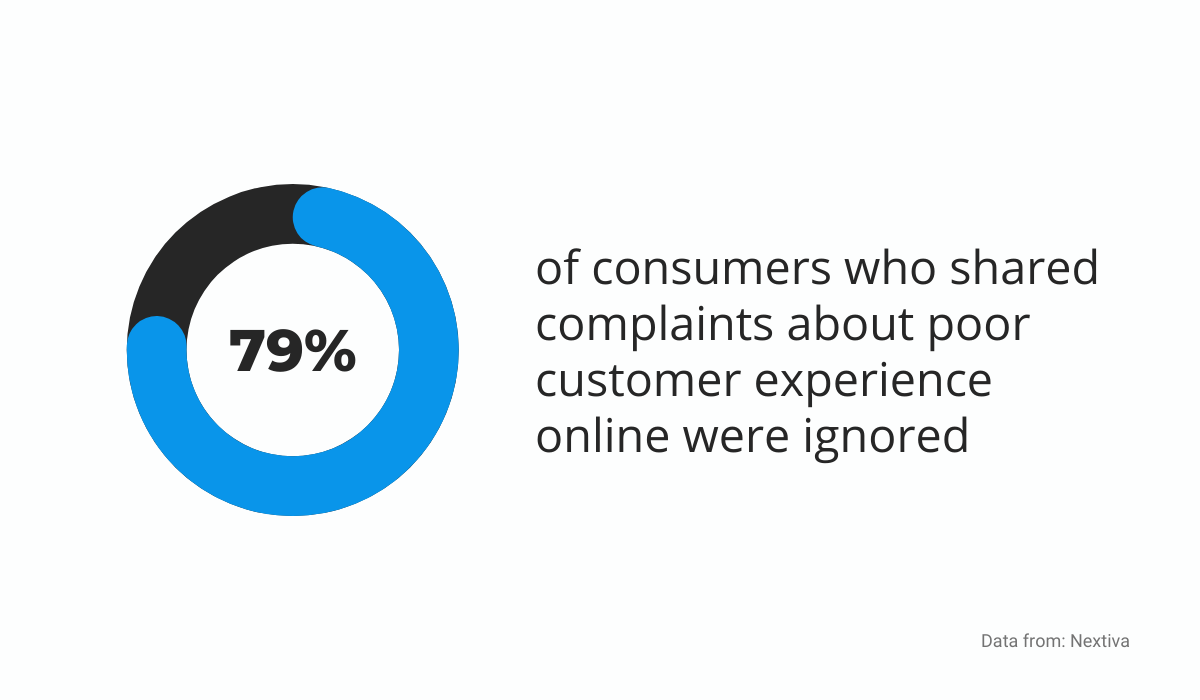
Source: Regpack
You can probably assume why ignoring your customers isn’t good for your business—if you don’t pay attention to them and their needs, you risk damaging your relationship with them irreparably.
And communication is key to nurturing any relationship.
Friendly communication doesn’t mean that you have to smile while your clients walk all over you. You can be yourself.
Take a look at Skyscanner’s communication with their user James Lloyd after he shared a screenshot of the Skyscanner app.
The app indicated that he’d have a 47-year long layover in Bangkok.

Source: Facebook
The response from Skyscanner went viral. They made a whole itinerary for Lloyd to fill his 47 years in Bangkok, including a cruise, spending time in a Moon Bar, and becoming a Tai Chi master.
However, they weren’t disrespectful and acknowledged their mistake, as well as thanked him for pointing out a glitch in their system. Lloyd appreciated their communication style and continued to joke with them in the comments.
Keep in mind that humor is highly subjective, and you should be careful with using it in communication with clients. But, being friendly and responsive is one of the rare things that is always appreciated by clients, regardless of the industry.
To sum up, polished communication skills can get you anywhere with your clients. Being approachable and friendly puts them at ease and builds the reputation of your business as one which cares about its clients, and that’s a powerful magnet for existing and potential clients.
Empathy Is the Goal
Showing empathy toward your clients is an important skill you should cultivate. That approach can result in many positive outcomes, and managing your clients in an empathetic way can ensure that they stay with you.
Empathy starts with active listening, which doesn’t just involve hearing the words that come out of your clients’ mouths.
When you listen actively, you also pay attention to non-verbal signs like body language and facial expressions, or tone of their voice—everything that conveys a message and the emotions attached to it.
Of course, if you’re not communicating face-to-face, that can be very challenging.
However, even when interacting remotely, you should listen to every customer as closely as possible and show understanding, because some clients just want you to acknowledge their issues.
According to a Customer Care Measurement & Consulting LLC survey, more customers want empathy from you when they complain than monetary compensation for their troubles.
Only 42% of them said they were satisfied with the financial solution, 50% said they preferred an empathy-based apology, and 60% said they were satisfied with receiving both.
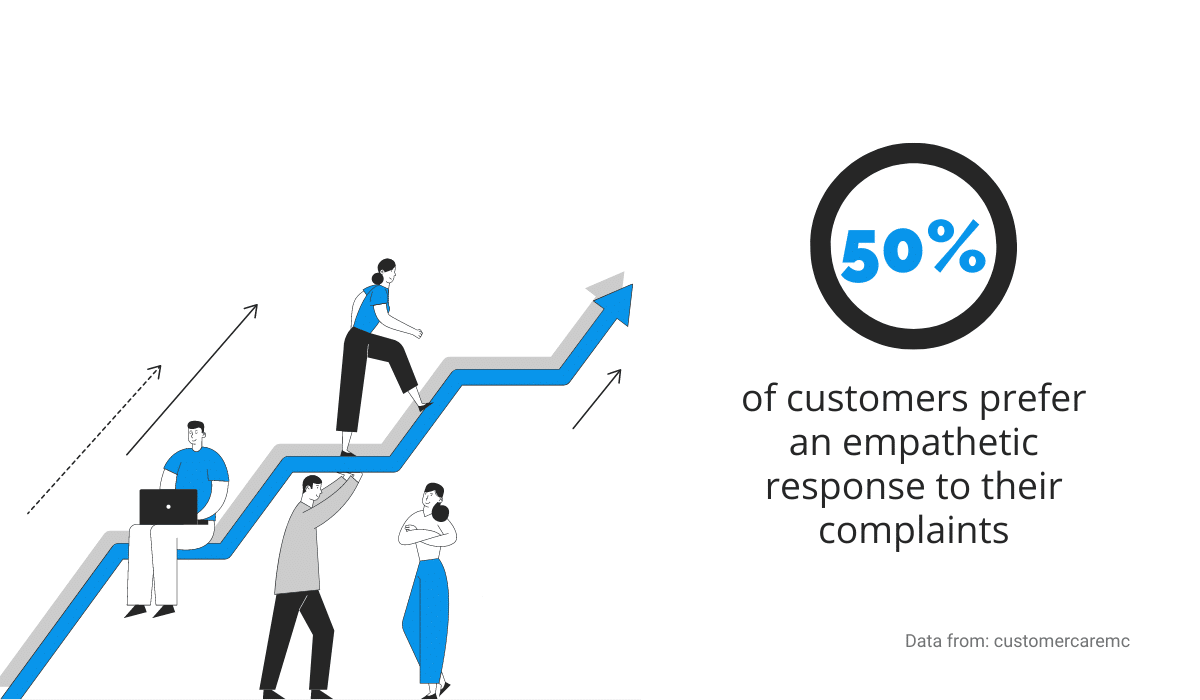
Source: Regpack
Woolworths, an Australian chain of supermarkets, practices empathy in relations with their customers.
For example, in the email they sent to their customer, there was a mistake, and the customer was addressed by the wrong name.

Source: vision6
They chose to approach it with empathy and a genuine apology.
The person behind the email at Woolworths was able to put themselves in the shoes of the customer who received a seemingly personalized email, only to see the wrong name on it.
Putting yourself in your clients’ shoes is a big part of empathetic behavior.
David Neeleman, founder and former CEO of JetBlue Airways, displayed a high level of empathy for the passengers who were stranded due to bad weather.
Flights were canceled or delayed, and JetBlue customer service was mostly unavailable. Passengers were reasonably frustrated with the situation.
Neeleman issued a lengthy apology letter in which he took responsibility and expressed regret for what happened.
He even uploaded a video apology on YouTube, where he explained the steps the company will take to prevent situations like that from happening again.
Source: JetBlue on YouTube
Both the letter and the video demonstrated a high level of empathy for the clients; there’s no defensiveness, no passing the blame around.
Neeleman accepts the passengers’ criticisms and acknowledges their priorities—getting to their destination on time.
You don’t have to live through a business crisis like JetBlue to practice empathy in relationships with your clients. It’s a client management skill that you can develop in everyday situations and interactions.
Your clients will get an increasingly rare feeling in today’s corporate world—the feeling that you genuinely care for them.
Conclusion
Managing clients can seem simple.
After all, all you have to do is solve their problems with confidence, patience, and persuasiveness, while being friendly and showing empathy towards your clients.
However, every one of those skills should be practiced—and regularly. They are very nuanced, and being rusty in any of them might cause you to lose your customers.
If you put everything we’ve examined in this article into practice, your customers will be satisfied, and your business will thrive.


















